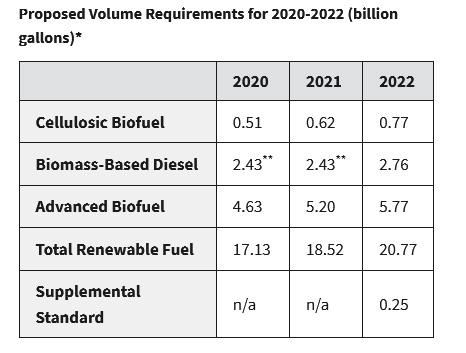 The Environmental Protection Agency (EPA) today proposed a package of actions setting biofuels volumes for years 2022, 2021, and 2020, and introducing regulatory changes intended to enhance the program’s objectives. In addition, EPA is seeking public comment on a proposed decision to deny petitions to exempt small refineries from their obligations under the RFS on the grounds that petitioners failed to show that EPA has a basis under the Clean Air Act (CAA) and recent federal case law to approve them.
The Environmental Protection Agency (EPA) today proposed a package of actions setting biofuels volumes for years 2022, 2021, and 2020, and introducing regulatory changes intended to enhance the program’s objectives. In addition, EPA is seeking public comment on a proposed decision to deny petitions to exempt small refineries from their obligations under the RFS on the grounds that petitioners failed to show that EPA has a basis under the Clean Air Act (CAA) and recent federal case law to approve them.
For 2022, EPA is proposing the highest total volumes in history, putting the program on a stable trajectory that provides for significant growth. The proposed volumes for 2022 are over 3.5 billion gallons higher than the volume of renewable fuel used in 2020. The proposed volume of advanced biofuel for 2022 is over 1 billion gallons greater than the volume used in 2020. EPA is also proposing to add a 250-million-gallon “supplemental obligation” to the volumes proposed for 2022 and stating its intent to add another 250 million gallons in 2023. This would address the remand of the 2014-2016 annual rule by the DC Circuit Court of Appeals in Americans for Clean Energy v. EPA. Spreading this obligation over two years would provide the market time to respond to this supplemental obligation. The last Administration failed to act on the Agency’s outstanding obligation to address the court’s remand.
Industry reaction to the proposal is mixed, with objections to retroactively reducing previously finalized 2020 Renewable Fuel Standards (RFS) requirements. The Renewable Fuels Association called the package “a modest step in the right direction for the nation’s ethanol producers and farmers.”
Specifically, RFA welcomes EPA’s proposal to set the 2022 RFS conventional renewable fuel requirement at the statutory volume of 15 billion gallons (bg) and its move to deny all pending small refinery exemption (SRE) petitions based on the unappealed holdings of the Tenth Circuit Court’s decision in the Renewable Fuels Association et al. v. EPA. The agency also said it will follow the Court’s ruling when it considers future SRE petitions. EPA’s proposal to restore 500 million gallons of illegally waived RFS requirements from 2016 —with that volume being added in the form of supplemental requirements to the 2022 and 2023 RFS requirements—also drew praise from RFA.

